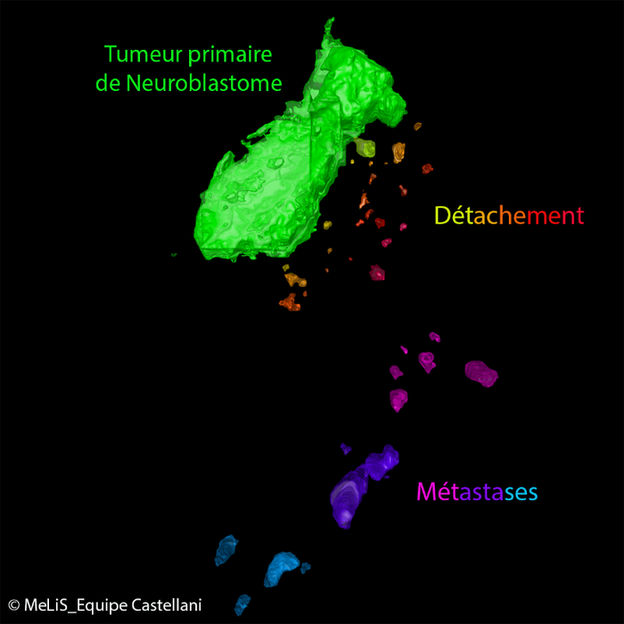Healthy cells can impact tumour progression during embryonic development
Avian embryo model of neuroblastoma
Half of childhood cancers arise during the development of the human embryo, which greatly complicates research into these diseases. The team of Valérie Castellani, CNRS senior researcher at the Mechanisms in Integrated Life Sciences (MeLiS) laboratory (CNRS / INSERM / Claude Bernard Lyon 1 University) has thus developed a model that optimally simulates the human embryonic environment by grafting human cancer cells into a chick embryo. This new method, for which Castellani won the 2018 CNRS Medal of Innovation, makes it possible to explore the mechanisms of metastasis, i.e. how cancer cells spread throughout the body, and to investigate the role of normal cells in the behaviour of malignant ones. Using the chick embryo model, Castellani’s team, in partnership with the Biology and Biotechnology for Health (BioSanté) laboratory (CEA / INSERM / Université Grenoble Alpes) and the Lyon Paediatric Haematology and Oncology Institute (Centre Léon Bérard / Hospices Civils de Lyon)1, trained their attention on neuroblastomas, paediatric cancers originating in neurons that have yet to mature. The metastatic forms of these cancers are extremely aggressive. Published in Nature Communications and led by Dounia Ben Amar, a PhD student cosupervised by CNRS researcher Céline Delloye-Bourgeois, the study found that certain healthy, developing neurons promote metastatic behaviour in the neuroblastoma cells with which they come into contact. It not only shows that normal cells can play a part in tumour progression during embryonic development, but also illustrates the importance of better understanding the unique developmental environment within which cancers of embryonic origin form.

Caption Avian embryo model of neuroblastoma. Physiological signals from embryonic tissues in which tumours develop cause some cells to acquire more aggressive traits, break away, and spread to remote sites, seeding metastases.
© MeLiS_Equipe Castellani
Original publication
Other news from the department science

Get the life science industry in your inbox
By submitting this form you agree that LUMITOS AG will send you the newsletter(s) selected above by email. Your data will not be passed on to third parties. Your data will be stored and processed in accordance with our data protection regulations. LUMITOS may contact you by email for the purpose of advertising or market and opinion surveys. You can revoke your consent at any time without giving reasons to LUMITOS AG, Ernst-Augustin-Str. 2, 12489 Berlin, Germany or by e-mail at revoke@lumitos.com with effect for the future. In addition, each email contains a link to unsubscribe from the corresponding newsletter.




















































